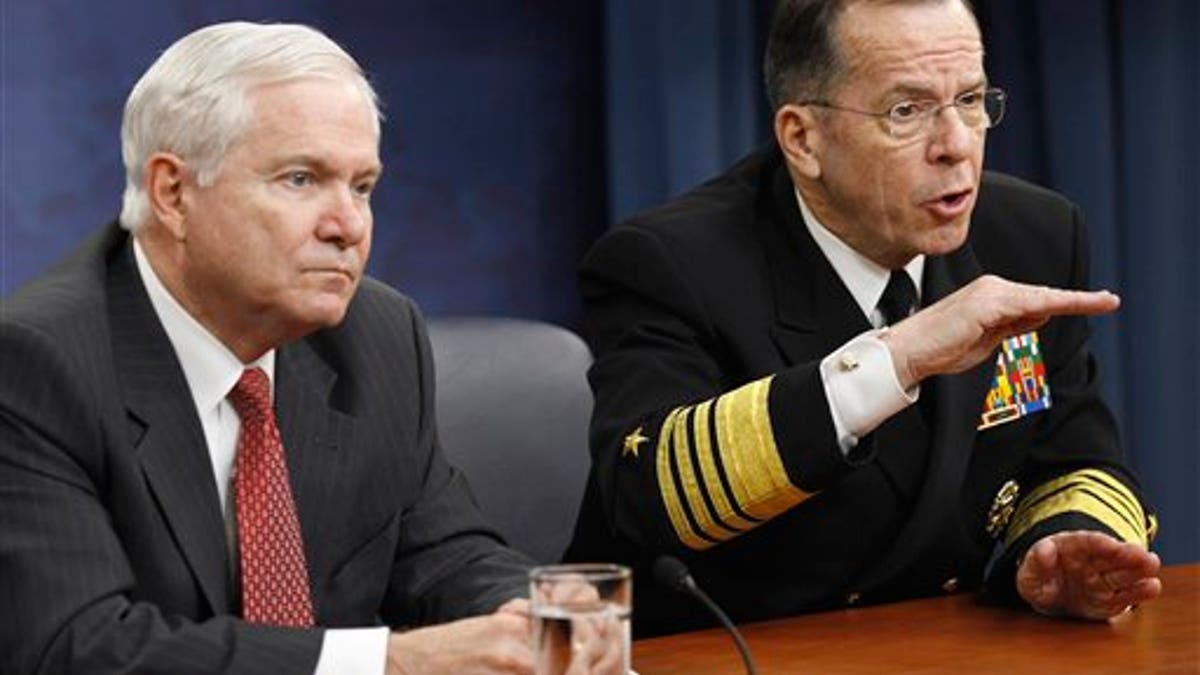
March. 1: Defense Secretary Robert Gates, left, and Joint Chiefs Chairman Adm. Mike Mullen take part in a news conference at the Pentagon. The Pentagon has confirmed that the Libyan government has used air strikes against rebel forces, a finding that bolsters those calling for a U.S. and NATO no-fly zone over the embattled region. (AP)
The Pentagon has confirmed that the Libyan government has used air strikes against rebel forces, a finding that could bolster those calling for a U.S. and NATO no-fly zone over the embattled region.
Citing media coverage of bombs being dropped over the coastal town of Brega, Pentagon Spokesman Col. Dave Lapan said it's clear the air force is on the offensive.
"It's very obvious that they have used air ordnance. We don't need to fly satellites over to confirm that," Lapan said.
Rebel leaders have urged that the U.N. impose a no-fly zone, which would allow American and allied forces to eliminate Libyan dictator Muammar al-Qaddafi's ability to strike from above.
But Lapan said this new evidence has yet to compel the U.S. and NATO to act.
"Irrespective of whether air has been used or not, the ongoing discussion about what the U.S. and others might do doesn't change." He added the decision is "not hinged upon whether air (power) is being used or not."
Speaking to Congress on Wednesday, Defense Secretary Robert Gates warned that establishing a no-fly zone would not be a simple task for the U.S. military.
"There is a lot of, frankly, loose talk about some of these military options. Let's just call a spade a spade. A no-fly zone begins with an attack on Libya to destroy the air defenses. That's the way you do a no-fly zone."
Gates added that it would be a "big operation over a big country" and that it would require more aircraft than are currently on the nearby carrier, USS Enterprise.
On Thursday, Sen. John McCain took issue with those comments, suggesting there are other way to do this that don't include preemptive strikes. He directed his remarks at Gen. Martin Dempsey, who was on Capitol Hill for his first hearing since being nominated as the next Army chief of staff.
"If we tell the Libyans and Qaddafi that we are imposing a no-fly zone, that is a strong deterrence to many of their pilots as to whether to fly or not," McCain said. "We've already seen pilots defect. We're already seen a couple of them land in Malta. Wouldn't that have a certain deterrent effect on them psychologically?"
Dempsey offered a short reply saying deterrence is always a good option.
A senior Pentagon official suggested to Fox News that such a scenario could draw U.S. fighters into air to air combat, a situation that could impose higher risks.
As the debate continues about whether or not to use force, the military is positioning itself for a large humanitarian relief effort. It currently has five warships in the Mediterranean Sea and one aircraft carrier nearby in the Red Sea. The last two U.S. ships to arrive in the Mediterranean, the USS Ponce and the USS Kearsarge, both have the ability to take on patients in need of medical help and to deliver a large amount of cargo on shore.
For military planners thinking about delivering aid to rebel-held regions, there are more than just humanitarian concerns. A strategy for relief must also consider the possibility Qaddafi use force to try to stop aid from reaching the rebels.




